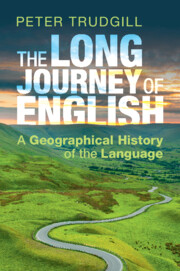Book contents
- The Long Journey of English
- The Long Journey of English
- Copyright page
- Dedication
- Contents
- Figures and Maps
- Acknowledgements
- Prologue: A View from the Birthplace
- 1 Where It All Started: The Language Which Became English
- 2 The Journey Begins: The First Movement South
- 3 Interlude: A View from the Celtic Island
- 4 Heading West Again: The North Sea Crossing, 400–600
- 5 Anglo-Saxons and Celts in the British Highlands, 600–800
- 6 And Further West: Across the Irish Sea, 800–1200
- 7 Atlantic Crossing: On to the Americas, 1600–1800
- 8 Onwards to the Pacific Shore
- 9 Across the Equator: Into the Southern Hemisphere, 1800–1900
- 10 Some Turning Back: English in Retreat
- 11 Meanwhile … Britain and the British Isles from 1600
- 12 Transcultural Diffusion: The New Native Englishes
- Epilogue: Sixteen Hundred Years On
- References
- Index
- References
7 - Atlantic Crossing: On to the Americas, 1600–1800
Published online by Cambridge University Press: 25 May 2023
- The Long Journey of English
- The Long Journey of English
- Copyright page
- Dedication
- Contents
- Figures and Maps
- Acknowledgements
- Prologue: A View from the Birthplace
- 1 Where It All Started: The Language Which Became English
- 2 The Journey Begins: The First Movement South
- 3 Interlude: A View from the Celtic Island
- 4 Heading West Again: The North Sea Crossing, 400–600
- 5 Anglo-Saxons and Celts in the British Highlands, 600–800
- 6 And Further West: Across the Irish Sea, 800–1200
- 7 Atlantic Crossing: On to the Americas, 1600–1800
- 8 Onwards to the Pacific Shore
- 9 Across the Equator: Into the Southern Hemisphere, 1800–1900
- 10 Some Turning Back: English in Retreat
- 11 Meanwhile … Britain and the British Isles from 1600
- 12 Transcultural Diffusion: The New Native Englishes
- Epilogue: Sixteen Hundred Years On
- References
- Index
- References
Summary
During the 1600s, the southwards and westwards expansion of Germanic, which had begun 2,000 years earlier in northern Europe, regained a new impetus. There was an explosive expansion of the English language into and across the Atlantic Ocean, which was to lead to the eventual death of a very large number of the indigenous languages of the Western Hemisphere. During the 1600s, 350,000 people left the British Isles for the Americas. Some of this expansion of English was the outcome of large-scale, planned, quasi-official attempts at colonisation. Others were haphazard settlements by refugees, pirates, runaway slaves, sailors, shipwrecked mariners and passengers and military deserters such those from the English army of Oliver Cromwell which had captured Jamaica from the Spanish in the 1650s.
Keywords
- Type
- Chapter
- Information
- The Long Journey of EnglishA Geographical History of the Language, pp. 76 - 98Publisher: Cambridge University PressPrint publication year: 2023

